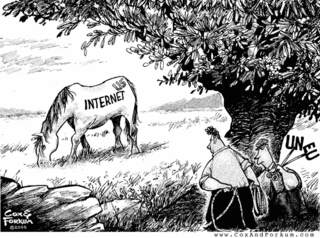
EU Wants Shared Control of InternetSep 30 10:00 AM US/Eastern
By AOIFE WHITEAP Business Writer
BRUSSELS, Belgium
The European Union insisted Friday that governments and the private sector must share the responsibility of overseeing the Internet, setting the stage for a showdown with the United States on the future of Internet governance.
A senior U.S. official reiterated Thursday that the country wants to remain the Internet's ultimate authority, rejecting calls in a United Nations meeting in Geneva for a U.N. body to take over.
EU spokesman Martin Selmayr said a new cooperation model was important "because the Internet is a global resource."
"The EU ... is very firm on this position," he added.
The Geneva talks were the last preparatory meeting before November's World Summit on the Information Society in Tunisia.
A stalemate over who should serve as the principal traffic cops for Internet routing and addressing could derail the summit, which aims to ensure a fair sharing of the Internet for the benefit of the whole world.
At issue is who would have ultimate authority over the Internet's master directories, which tell Web browsers and e-mail programs how to direct traffic.
That role has historically gone to the United States, which created the Internet as a Pentagon project and funded much of its early development. The U.S. Commerce Department has delegated much of that responsibility to a U.S.-based private organization with international board members, but Commerce ultimately retains veto power.
Some countries have been frustrated that the United States and European countries that got on the Internet first gobbled up most of the available addresses required for computers to connect, leaving developing nations with a limited supply to share.
They also want greater assurance that as they come to rely on the Internet more for governmental and other services, their plans won't get derailed by some future U.S. policy.
Policy decisions could at a stroke make all Web sites ending in a specific suffix essentially unreachable. Other decisions could affect the availability of domain names in non-English characters or ones dedicated to special interests such as pornography.
No comments:
Post a Comment